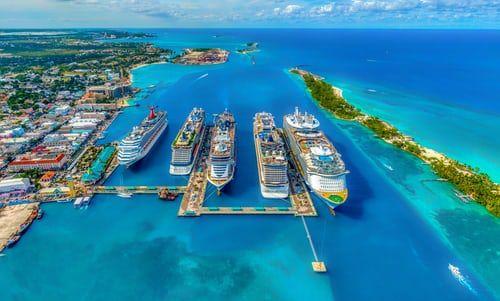

What is an Offshore Company?
An offshore company formation is an entity formed outside the country where its main operations are carried out. The term ‘offshore’ means that the company acts as a non-resident where it is formed or incorporated. Another prominent feature of an offshore company setup is that usually the company’s members and directors live outside the country where the company is incorporated giving the entity a non-residential status.
An offshore company definition, however, is not definite, as it largely depends upon the purview of the entity’s activities and the jurisdiction which the business entity was incorporated. Many countries omit the word ‘offshore’ entirely from the company ordinances even though the entity might function similarly to a company, such as Malta, Cyprus, Scotland, or England.

There are no clear-cut boundaries between onshore and offshore , as offshore financial services and corporate laws can be found in modern onshore financial centers. The state of Delaware in the United States, for instance, is one of the most historically significant corporate tax havens in the world, and yet know one knows about it.
Its simple legal structure and favorable corporate tax laws were shaped in the early 20th century to make it attractive and easy to form and manage a corporation.
As a result as of today, around 60% of the companies on the Fortune 500 list are incorporated in Delaware, making America one of the largest tax havens in the world.
Panama has taken its inspiration from US corporate laws, originally modeled after Delaware’s in 1927, that have evolved to include progressive business regulations from Lichtenstein creating an offshore financial centre that has parts of both worlds. Many nations aim to attract foreign businesses and investors by making corporate and tax laws friendly to non-residents individuals and international corporations.


Offshore jurisdictions offer tax-exempt status to foreign companies provided they restrict commercial activities outside the jurisdictions’ borders and do not engage in any type of business exchange with local residents. Additionally, many offshore jurisdictions’ corporate laws are written to ensure client confidentiality, the details of which are not usually made available to the public, phishing creditors, or intrusive foreign parties.
This is not to say that your details will never be shared, as it depends on whether the country is party to any TIEAs that are signed with your primary country of residence, which facilitates automatic tax information or are a signatory of the CRS. Both of which make it much more difficult to remain anonymous.
Though places like Panama and Nevis both known for the banking secrecy laws and fierce asset protection clauses, they will not share your details or make you report anything to your own country, however, the issue is the country where you reside which may require you to report your foreign income, assets, or companies.
In this situation, the only way to fully release yourself from the bondage of your home countries reporting and taxation requirements is to move residence and become a primary tax residence of a country that does not tax foreign earned income.

Offshore Companies act like any normal company but are held for taxation purposes outside the financial system where it is formed thus giving it certain benefits. Companies formed offshore are often used by anyone who owns a global, internet-based, digital, or services company. It can also act as a holding company for assets or bank accounts, for holding physical property, intellectual property, patents, or investments as well as many other financial and investment-related activities.
The benefits gained will be determined primarily on what one is hoping to achieve. While nearly everyone is hoping to reduce their taxes. It might not necessarily work for everyone to go from paying 40% taxes to 0% overnight. Though anyone can start a company offshore , not everyone receives the same benefits.
Individuals choose offshore companies for any number of reasons. Foreign jurisdictions provide a level of asset protection and security not normally found in traditional ‘onshore’ jurisdictions. This is because offshore financial centres have supportive corporate laws and liberal regulations that give space for companies to exist without restrictive requirements, high overheads, and onerous disclosure policies.

There are many benefits of an Offshore LLC which are given due to its pass-through tax structure, making it particularly attractive for investment purposes or for shared business ventures.
There are, however, some important questions you should ask yourself when setting up your offshore company.
The Memorandum of Association represents the companies external affairs and complements the Articles of Association which represents the internal dynamics and structure of the company including the by-laws, purpose of the company, organization of its members including the Director, Shareholder, and Secretarial duties, as well any financial obligations, share capital, meetings, and any day-to-day tasks.
These documents are sent off to the appropriate jurisdictions’ Corporate Registers Office.
z2Any additional requirements of a newly formed company post-incorporation are dependent upon your needs and wishes, which may include the appointment of the company’s first director, the first meeting and appointment of company officers, registration of directors (in which nominee services may be used), issuance of company shares, and the opening of any international bank account.
Opening a corporate account for your offshore company is quickly becoming standard practice these days as many foreign jurisdictions are making it more difficult to open a personal account without a local company.
A business or corporate account actually gives you more advantages than a normal personal account and if properly paired with a multi-jurisdictional corporate structure, can be used efficiently to take payment processing from places such as Stripe and Paypal from pretty much anywhere in the world without running into difficulties.
Being able to receive funds from clients and customers is perhaps the most important and the most difficult piece of the offshore puzzle. Making sure that corresponding banks will accept transfers, that your banks will continue to allow large transfers using these mediums while following all of the rules making sure you have fulfilled all of your obligations is why we are here, to help you make sure you have a solid plan in place.